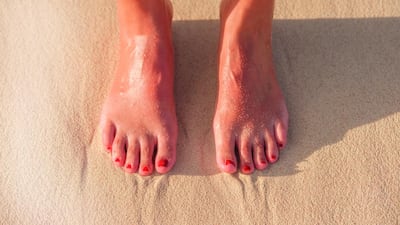For many people, feet are about as attractive as a pair of old trainers, which might explain why they’re so often neglected when it comes to personal health.
But feet are one of the most important parts of the body, taking on one-and-a-half times our weight when walking and up to four times when running. They also carry each person for approximately 185,000 kilometres during their lifetime.
According to the United Kingdom’s National Health Service Foundation Trust, 75 per cent of people experience foot problems at some time in their life, and these are largely caused by a lack of basic care.
Susan Tulley, head of podiatry at Healthpoint hospital in Abu Dhabi, says that ailments such as corns, blisters and sprains can be avoided simply by wearing well-fitting, sensible footwear, including sandals with an adjustable strap over the foot and another around the heel.
When it comes to sports, to prevent callouses, Tulley warns against walking barefoot on a treadmill, instead recommending lace-up shoes or footwear with a Velcro fastening.
Dr Saf Naqvi, medical director at Abu Dhabi’s Imperial College London Diabetes Centre, agrees.
“Footwear must fit feet and not the other way around,” he says. “Have your feet measured regularly as they can change shape and size.”
Good foot care is especially important for diabetics, who often suffer nerve damage and because of loss of sensation may not realise they have a problem with their feet. For this reason, it is recommended that diabetics examine their feet and nails every day.
The most common foot problems among patients at ICLDC include callouses, diabetes-induced ulcers and ingrowing toenails. Bunions and corns are also prevalent and often the result of ill-fitting shoes.
Fungal infections such as athlete’s foot, meanwhile, thrive in moist conditions, so slip on waterproof socks in public showers and avoid wearing other people’s shoes. This will also help prevent verrucae – non-cancerous warts on the soles of feet – which is often caught at swimming pools.
Naqvi recommends changing your socks often to avoid the spread of fungus, nasty odours and other common foot problems.
“Before you put on shoes and socks, check for objects – sharp and otherwise – that may have fallen inside or become attached,” he says, “and wash your socks and stockings after every use.”
Healthpoint and ICLDC recommend making foot care a priority and having them regularly checked by your doctor and/or podiatrist.

